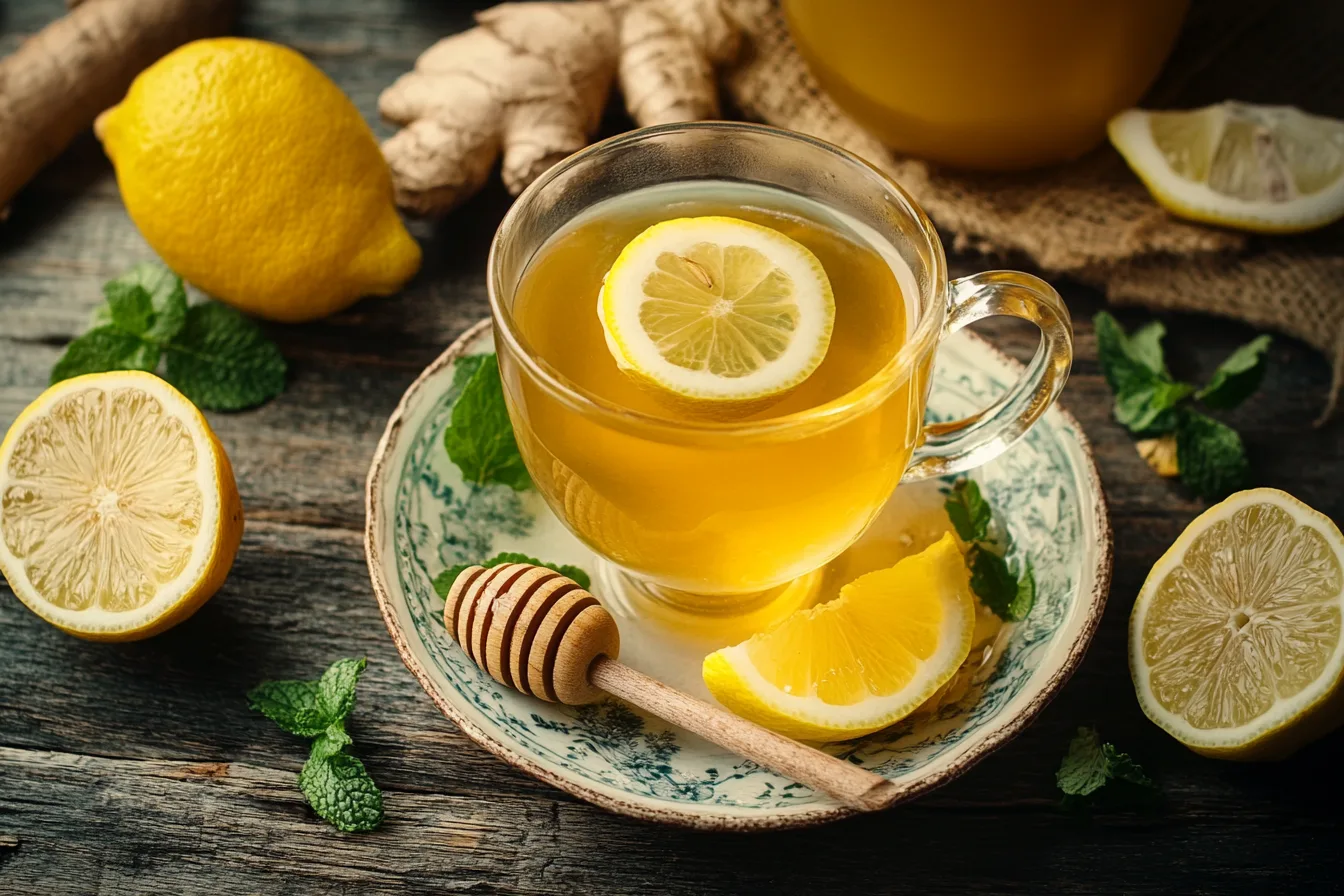Introduction to Ginger Lemon Tea with Honey
Ginger Lemon Tea with Honey is more than just a warm beverage—it’s a centuries-old remedy that continues to thrive in kitchens and wellness routines across the globe. Combining the bold, spicy warmth of ginger, the zesty brightness of lemon, and the smooth sweetness of honey, this tea delivers a comforting yet invigorating experience with every sip.
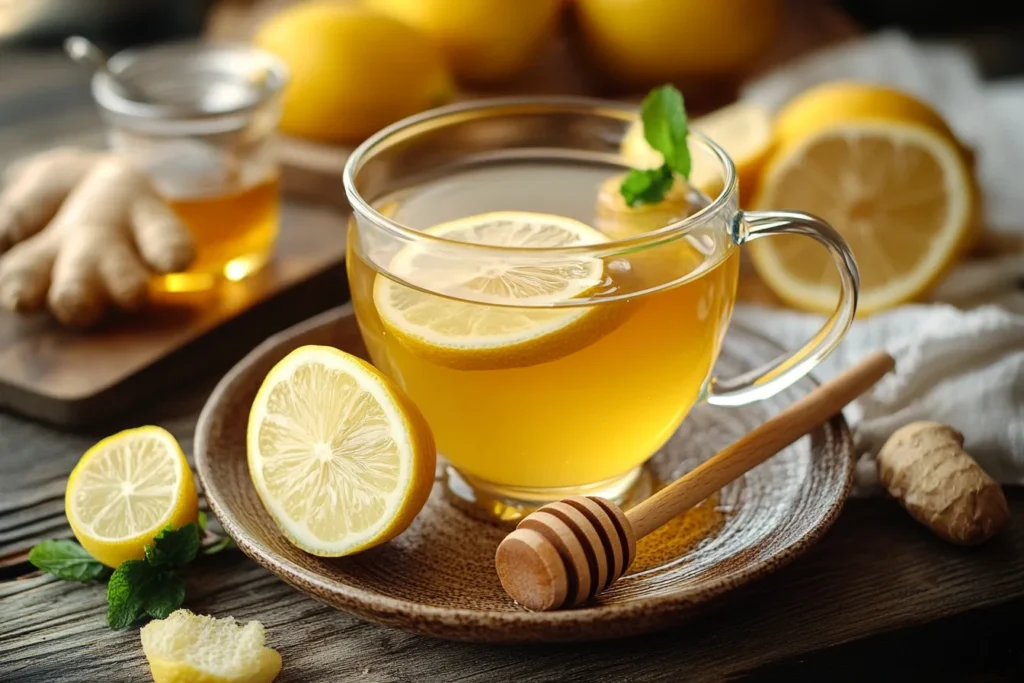
So, what exactly is ginger lemon honey tea? At its core, it’s a simple infusion of fresh or dried ginger root, a squeeze of fresh lemon juice, and a spoonful of honey, served in hot water. But its simplicity belies its depth. Each ingredient contributes both flavor and function, transforming this tea into a powerhouse of holistic health.
Traditional Uses and Cultural Significance
This blend is deeply rooted in traditional medicine. In Ayurvedic and Chinese practices, ginger and lemon have long been used for digestion, inflammation, and immunity. Honey, meanwhile, is revered across cultures as both a remedy and sacred food. From ancient Egypt to Indian Vedic texts, honey has symbolized healing and nourishment.
Today, this trio continues to shine in modern wellness circles as a go-to natural elixir for:
- Easing sore throats
- Supporting digestion
- Detoxifying the body
- Boosting immunity
- Replacing sugary drinks with a healthier option
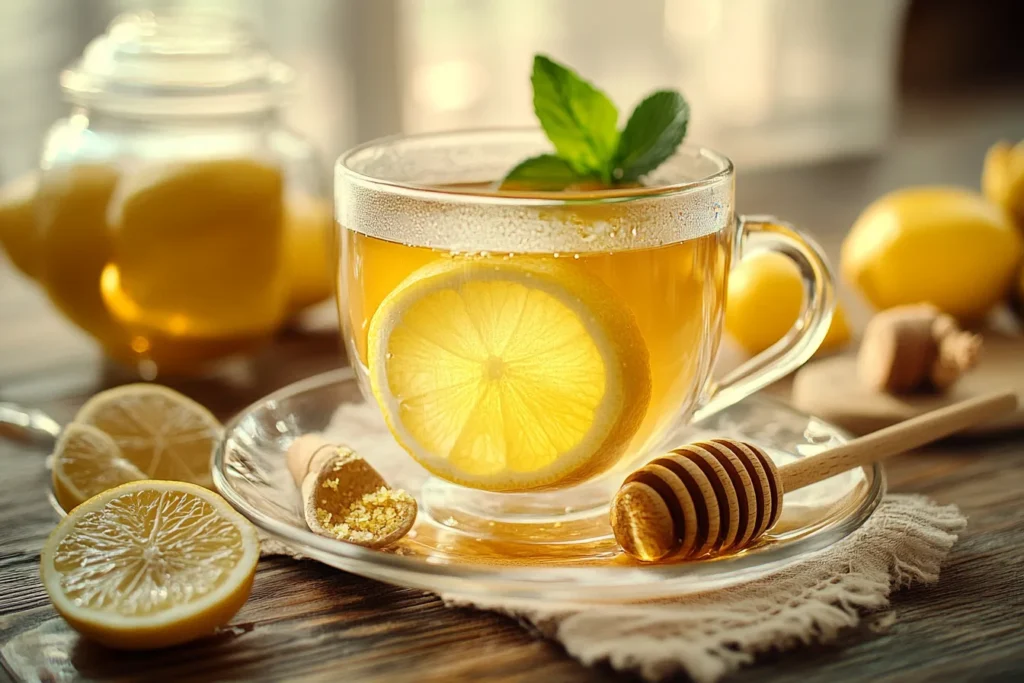
Rising Popularity in Natural Wellness
In an era where many seek alternatives to synthetic medications and sugar-laden beverages, ginger lemon honey tea has emerged as a functional beverage of choice. It’s easy to make, affordable, and packed with real ingredients you can trust.
Whether you’re sipping it to soothe a cold or kickstart your morning, this tea bridges ancient wisdom with modern science—proving that the best remedies often come from your own kitchen.
Health Benefits of Ginger
Ginger (Zingiber officinale) is one of the most well-researched herbs in natural medicine—and for good reason. Its bioactive compounds, especially gingerol, offer a wide range of benefits.
Anti-Inflammatory and Antioxidant Properties
- Ginger contains powerful antioxidants that combat free radical damage, helping reduce chronic inflammation and support long-term health.
- Its anti-inflammatory effects have been shown to ease joint pain and support the body’s response to stress.
Supports Digestion and Relieves Nausea
- Ginger stimulates digestive enzymes and bile production, promoting smoother digestion.
- It’s particularly known for reducing nausea and vomiting, including motion sickness and morning sickness.
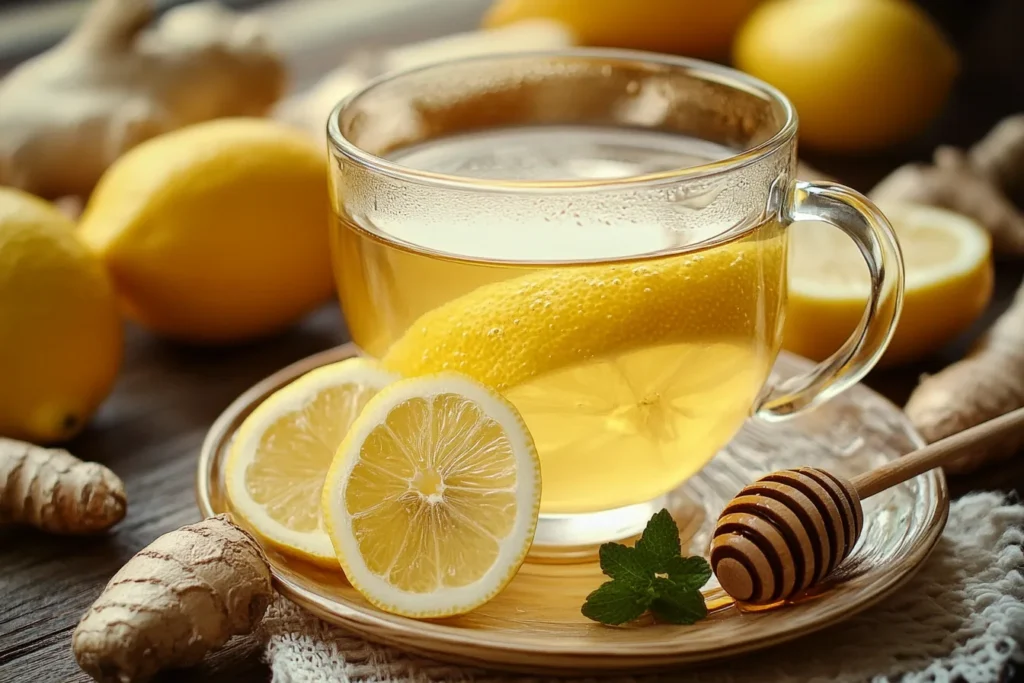
Boosts Circulation and Immunity
- Ginger promotes healthy blood flow and improves circulation—especially helpful during cold weather.
- It also possesses antimicrobial and antiviral properties, which help fortify your body’s natural defenses.
Whether steeped fresh or used as powder, ginger is a must-have for keeping your digestive and immune systems in balance.
Health Benefits of Lemon
The humble lemon does more than add a tangy kick to tea—it’s a nutritional powerhouse, especially rich in vitamin C.
Rich in Vitamin C
- Just one lemon offers over 50% of your daily vitamin C, essential for immune health, skin repair, and iron absorption.
- Vitamin C also helps fight off colds and infections by supporting the body’s natural defense mechanisms.
Alkalizing Effects on the Body
- While lemons are acidic in nature, they actually have an alkalizing effect post-digestion, helping maintain your body’s optimal pH balance.
- An alkaline internal environment supports reduced inflammation and improved metabolic function.
Helps with Detox and Hydration
- Lemon acts as a natural diuretic, gently encouraging the body to flush out toxins.
- It also supports hydration and liver function, especially when consumed first thing in the morning.
Lemon isn’t just for flavor—it’s a key ingredient in promoting clarity, detox, and cellular health.
Why Honey Makes This Tea Even Bette
Adding honey transforms this tea from effective to exceptional. It brings a soothing sweetness along with a host of medicinal benefits.
Natural Sweetener with Antibacterial Properties
- Raw honey contains enzymes and antioxidants that help fight bacteria and viruses.
- Unlike refined sugar, it offers trace minerals and naturally occurring nutrients.
Soothes the Throat
- Honey coats the throat, making it perfect for relieving irritation caused by coughing, dry air, or seasonal allergies.
- It also encourages the body to produce healing mucus, aiding recovery.
Supports Gut Health
- Honey has prebiotic properties, which help feed beneficial gut bacteria.
- It may also help reduce gas and bloating, especially when combined with ginger.
Choose raw or local honey to get the maximum health benefits—it’s more potent and less processed than regular store-bought varieties.
How Ginger Lemon Tea with Honey Supports Immunity
When you combine ginger, lemon, and honey, the result is a tea that’s greater than the sum of its parts—a true immunity-boosting trio.
Synergistic Effects of All Three Ingredients
- Ginger fights pathogens and lowers inflammation
- Lemon provides vitamin C to boost immune cell function
- Honey soothes and supports the respiratory tract
Together, they form a natural defense system that’s especially helpful during cold and flu season.
Daily Consumption for Immune Maintenance
- Drinking this tea daily provides a steady stream of immune-supporting compounds, reducing your vulnerability to common illnesses.
- Regular use may also shorten the duration and reduce the severity of symptoms when you do get sick.
Ideal for Cold and Flu Season
- Drink hot to open sinuses and ease congestion
- Sip throughout the day for continuous relief and hydration
- Add extra lemon and honey to create a powerful natural cough syrup
Digestive Benefits of This Tea Blend
Ginger lemon honey tea is not just a comfort drink—it’s a digestive tonic that can reset your gut and reduce discomfort.
Stimulates Bile and Digestive Enzymes
- Ginger and lemon stimulate the liver and pancreas, encouraging the production of bile and digestive fluids
- This makes food breakdown more efficient and eases digestive strain
Helps Reduce Bloating and Indigestion
- Ginger acts as a carminative, reducing gas buildup in the intestines
- Lemon helps cut through heaviness and boosts stomach acid when needed
Gentle on the Stomach
- This tea is soothing yet stimulating, meaning it helps with digestion without overwhelming the gut
- It’s a great remedy after heavy meals or to calm a nervous stomach
Why It’s a Perfect Morning or Bedtime Drink
This tea can seamlessly fit into your morning wake-up call or nighttime wind-down routine, depending on how you tweak it.
Morning Benefits: Energy, Metabolism, Clarity
- Kickstart your day with a light, clean beverage that jumpstarts your metabolism
- Lemon promotes hydration and mental clarity
- Ginger boosts circulation and gets your body moving
Nighttime Benefits: Calm, Digestion, Sleep Prep
- A warm cup before bed can settle your stomach and calm your mind
- Honey supports serotonin production, which aids in sleep
- Add chamomile or lavender for deeper relaxation
Whether hot or iced, this tea works at any hour—it’s all about how you personalize it.
Calorie and Nutrient Breakdown
This tea is low in calories but rich in flavor, functionality, and trace nutrients.
Low in Calories
- 1 cup of ginger lemon honey tea typically has:
- ~5–10 calories from lemon and ginger
- ~60 calories from 1 tablespoon of honey
- You can adjust honey quantity to fit dietary goals
Natural Sugars and Trace Minerals
- Honey provides glucose, fructose, and B vitamins
- Lemon adds vitamin C, potassium, and magnesium
Customizing for Dietary Needs
- Reduce or skip honey for low-sugar diets
- Use a honey substitute (see Part 2) for vegan options
- Add turmeric or cinnamon to increase anti-inflammatory properties without adding calories
Allergy Considerations and Precautions
Even natural remedies require careful consideration, especially if you have allergies or sensitivities.
Who Should Avoid Raw Honey
- Infants under 12 months should never consume raw honey due to the risk of botulism
- Those with bee-related allergies should use with caution
Ginger Sensitivity
- Some people experience heartburn or stomach upset from concentrated ginger
- Start with small amounts and increase as tolerated
Interactions with Medications
- Ginger may interact with blood thinners, diabetes medication, or high blood pressure drugs
- Always check with your healthcare provider if you’re on medication or have a chronic condition
Ginger Lemon Honey Tea vs. Other Herbal Teas
There are plenty of soothing herbal teas out there—but this particular trio offers a unique flavor profile and functional edge.
Unique Combination of Sweet, Sour, and Spice
- The balance of honey’s sweetness, lemon’s acidity, and ginger’s heat creates a multi-dimensional drink that stands out from typical blends.
Comparison with Chamomile, Green Tea, etc.
- Unlike chamomile, which is more sedating, this tea is both energizing and calming.
- Unlike green tea, it’s caffeine-free—perfect for sensitive drinkers or nighttime use.
Why This Trio Stands Out
- It’s versatile, therapeutic, and easy to adapt to your needs
- It offers immune, digestive, and anti-inflammatory benefits in one warm cup
Recipes & Preparation Variations
Classic Ginger Lemon Tea with Honey Recipe
Making ginger lemon tea with honey from scratch is incredibly simple and requires only a handful of natural ingredients. Whether you’re new to this herbal infusion or looking to refine your technique, mastering the classic recipe is the perfect starting point.
Simple Ingredients and Tools
- 1–2 inches of fresh ginger root, peeled and sliced
- ½ to 1 tablespoon of fresh lemon juice
- 1 tablespoon of raw honey
- 2–3 cups of filtered water
- Saucepan, strainer, and a favorite mug
Step-by-Step Brewing Method
- Bring the water to a gentle boil in a saucepan.
- Add the sliced ginger, reduce heat, and simmer for 10–15 minutes.
- Remove from heat, then strain the tea into your cup.
- Stir in the lemon juice.
- Let the tea cool slightly (to under 120°F) before adding raw honey to preserve its enzymes.
- Stir well and sip slowly.
Pro Tips for Best Flavor
- For stronger tea, grate the ginger instead of slicing.
- For a milder tea, use thinner slices and steep for less time.
- Adjust lemon and honey to taste—some prefer it tangy, others sweet.
This base recipe can be easily customized with add-ins, which we’ll explore in later sections.
Hot vs. Iced Ginger Lemon Honey Tea
Whether you’re warming up on a cold evening or cooling down on a summer afternoon, ginger lemon tea adapts beautifully to both hot and cold formats.
Benefits of Drinking It Hot or Cold
- Hot tea opens sinuses, soothes sore throats, and supports digestion.
- Iced tea is cooling, hydrating, and a great soda alternative.
Iced Tea Preparation Techniques
- Follow the classic recipe and let the tea cool to room temperature.
- Refrigerate for at least 2 hours or until chilled.
- Serve over ice with a lemon wedge and a mint sprig for refreshment.
Refreshing Summer Twist
- Infuse with cucumber slices or basil for a spa-like flavor.
- Replace lemon with lime for a zestier edge.
- Make in batches and store in a glass pitcher for the week.
Iced versions are especially helpful for keeping your immune routine consistent in hot climates.
Using Fresh vs. Dried Ginger
Not all ginger is created equal. Choosing between fresh and dried affects both taste and therapeutic potency.
Flavor and Potency Comparison
- Fresh ginger delivers a spicy, clean heat and more volatile oils.
- Dried ginger powder is more concentrated but has an earthier, warmer tone.
When to Use Fresh Slices or Ground Powder
- Use fresh ginger when making tea from scratch for best flavor and maximum health benefits.
- Use ground ginger when you’re in a pinch, traveling, or making a quick single-serving cup.
Storage and Preparation Tips
- Store fresh ginger in the fridge wrapped in a paper towel or freeze whole for longer use.
- Dried ginger should be kept in a sealed jar away from light and moisture.
For a deeper punch, use both forms together: fresh for freshness, dried for depth.
Raw vs. Boiled Honey: What’s the Difference?
One of the most common questions is when to add the honey. The answer? It depends on what you’re trying to preserve.
Nutritional Content After Heating
- Raw honey contains live enzymes, probiotics, and antioxidants.
- When exposed to temperatures above 120°F, some of these beneficial compounds break down.
How to Preserve Enzymes
- Let your tea cool slightly before adding honey.
- Stir in honey after steeping, not during the boiling process.
When to Stir in Honey
- For medicinal use (immune or digestive health), always wait to cool slightly.
- For taste only, add it earlier—but understand the therapeutic loss.
If you want full benefits, treat honey like a supplement, not just a sweetener.
Adding Extra Herbs and Spices for Variety
Spicing up your ginger lemon tea doesn’t just add flavor—it adds layered health benefits. The combinations are endless.
Mint, Cinnamon, Turmeric, and Cloves
- Mint: cooling, calming, great for digestion
- Cinnamon: blood sugar support and warming spice
- Turmeric: anti-inflammatory powerhouse (add black pepper for absorption)
- Cloves: antimicrobial and warming, perfect in colder months
Flavor Combinations and Health Boosts
- Ginger + Lemon + Cinnamon + Clove = autumn comfort blend
- Ginger + Lemon + Mint + Honey = digestive and cooling combo
- Ginger + Lemon + Turmeric + Black Pepper = daily anti-inflammatory tonic
Crafting Your Perfect Blend
- Experiment with 1 new herb at a time.
- Start with 1/4 tsp of powdered spice or a few leaves/pieces for fresh additions.
- Let steep alongside ginger for best results.
Add a few fresh basil or rosemary leaves for an aromatic and antioxidant-rich twist.
Making a Concentrate for Weekly Use
If you want to drink ginger lemon tea daily without brewing every time, creating a tea concentrate is your solution.
Brewing in Batches
- Multiply the classic recipe ingredients (e.g., 10 cups water, 10 inches ginger).
- Simmer ginger in water for 30 minutes for a stronger brew.
- Add lemon juice after removing from heat and cool completely.
How to Store and Dilute
- Pour into glass jars or bottles, refrigerate for up to 7 days.
- Use 1 part concentrate to 2 parts hot water when ready to drink.
- Add honey right before drinking to maintain potency.
Benefits for Busy Mornings
- Saves time and ensures consistency.
- Keeps your daily immune ritual effortless and accessible.
Sweetener Alternatives if You Don’t Use Honey
For vegans or those avoiding honey, there are plenty of natural alternatives that complement ginger lemon tea.
Maple Syrup, Agave, or Stevia
- Maple syrup: rich and earthy, good for hot tea
- Agave nectar: sweet and mild, blends well in iced tea
- Stevia: calorie-free and herbal, a little goes a long way
Flavor Changes and Health Considerations
- Maple syrup adds antioxidants and minerals.
- Agave has a high fructose content, so use sparingly.
- Stevia has no effect on blood sugar, ideal for diabetics.
Vegan-Friendly Options
- Date syrup, molasses, and monk fruit sweeteners also work well.
- Taste test to find your favorite balance between sweet and spicy.
If skipping all sweeteners, boost flavor with extra lemon or cinnamon.
Ginger Lemon Honey Tea with Apple Cider Vinegar
This variation is often recommended for detox, digestion, and metabolism support.
Boosting Detox Potential
- Apple cider vinegar (ACV) is rich in acetic acid, which supports digestion, blood sugar control, and gut bacteria.
Taste Balancing Tips
- Use 1 teaspoon ACV per cup, added after steeping
- Counterbalance acidity with extra honey or lemon
- Stir well and drink slowly
When and How to Consume It
- Best taken in the morning on an empty stomach
- Avoid if you have acid reflux or ulcers
Use raw, unfiltered ACV with “the mother” for maximum benefits.
Cold Remedy Recipe Version
When you’re under the weather, turn your tea into a natural medicine cabinet.
Doubling Ginger and Honey
- Use extra ginger (3–4 inches sliced) for a stronger brew
- Add 2 tablespoons honey for a throat-soothing and antimicrobial effect
Adding Garlic or Cayenne
- Raw garlic: antibacterial and antiviral—crush and steep
- Cayenne pepper: stimulates circulation and clears sinuses—use a pinch
Sipping Throughout the Day
- Drink a cup every 2–3 hours for symptom relief
- Store in a thermos or insulated bottle to keep warm all day
Add a few drops of echinacea or elderberry syrup for added immune support.
Kid-Friendly Ginger Lemon Honey Tea
Kids can benefit from this tea too—with a few gentle adjustments.
Reducing Intensity of Flavors
- Use half the amount of ginger and more honey
- Skip strong spices like cayenne or garlic
Adding Fun Garnishes
- Float a lemon slice or orange wheel
- Stir with a cinnamon stick or colorful spoon
- Let kids choose a “magic” ingredient like mint or berry
Serving Warm, Not Hot
- Always test temperature before serving
- Serve in a cute mug or thermos to make it fun and cozy
You can also freeze the tea into ice pops or serve it chilled with fruit for a hydrating treat.
Great! Let’s wrap up the guide with Part 3: Storage, Serving Tips, FAQs & Conclusion of the long-form article on Ginger Lemon Tea with Honey.
Storage, Serving Tips, FAQs & Conclusion
Best Practices for Storing Tea and Ingredients
To enjoy the full flavor and health benefits of your ginger lemon honey tea, proper storage of the tea itself and its ingredients is essential.
Storing Fresh Ginger and Lemons
- Ginger: Wrap peeled or unpeeled ginger in a paper towel, then store in a resealable bag in the fridge. It can last up to 3 weeks.
- For longer storage, freeze ginger whole and grate it directly from frozen.
- Lemons: Keep lemons in the fridge crisper drawer to extend freshness for up to 4 weeks. You can also freeze lemon juice in ice cube trays.
Keeping Honey Safe and Fresh
- Store honey in a cool, dark place—never the fridge.
- Use a clean, dry spoon to avoid introducing moisture.
- Crystallized honey is safe; warm the jar in hot water to return it to liquid.
Making and Refrigerating Tea in Advance
- Brew larger batches of tea and refrigerate for up to 5 days.
- Store in glass containers with tight lids to preserve freshness and flavor.
- Add lemon and honey after reheating or just before drinking for best nutritional impact.
Label containers with the date brewed to track freshness, especially when using for cold or flu support.
Serving Suggestions for Different Times of Day
The versatility of this tea means you can adapt it to any time of day—with different enhancements based on your needs.
Energizing Morning Additions
- Add a pinch of cayenne or turmeric to jumpstart metabolism.
- Use less honey and more lemon for a zesty wake-up.
- Pair with your daily vitamins or a protein-rich breakfast.
Relaxing Evening Herbal Blends
- Mix with calming herbs like chamomile, lavender, or lemon balm.
- Use extra honey and a cinnamon stick for warmth.
- Sip slowly while journaling or unwinding.
Pairing with Light Meals or Snacks
- Morning: enjoy with whole grain toast and nut butter.
- Midday: pair with fruit and yogurt or a salad.
- Evening: match with crackers and hummus or steamed veggies.
Try using it as a non-caffeinated replacement for coffee or as a gentle “nightcap.”
Pairing Ginger Lemon Honey Tea with Foods
Pairing the right foods with this tea enhances both digestion and satisfaction.
Breakfast Options
- Oatmeal with banana and chia seeds
- Avocado toast with red pepper flakes
- Almond butter on whole-grain bread with berries
These options complement the tea’s warming and cleansing nature.
Light Snacks
- Raw almonds or walnuts
- Plain yogurt with a drizzle of honey
- Rice cakes with tahini and apple slices
These make perfect midday tea companions that won’t weigh you down.
Avoiding Overly Sweet Pairings
- Because honey is already sweet, avoid combining it with pastries, muffins, or sugary cereals.
- Doing so can spike your blood sugar and dilute the tea’s health impact.
The tea’s tangy and spicy notes pair best with simple, whole foods.
Can You Drink This Tea Every Day?
Absolutely. In fact, daily consumption is one of the best ways to reap long-term benefits.
Recommended Frequency
- 1–2 cups per day is ideal for general wellness.
- Increase to 3–4 cups when fighting illness, especially if sipping unsweetened.
Potential Long-Term Benefits
- Improved digestion and reduced bloating
- Stronger immune response
- Better hydration and clearer skin
- Reduced sugar cravings (when replacing sweet beverages)
Listening to Your Body’s Response
- Monitor for any sensitivities, especially with high amounts of ginger.
- If pregnant or taking medications, consult your doctor about daily use.
Consistency is key: even one cup a day can make a noticeable difference over time.
Tips for Making It a Daily Ritual
Integrating this tea into your day can become a grounding, health-focused habit.
Setting a Morning or Night Routine
- Brew a cup first thing to start your day with purpose.
- End your evening with a calming variation to aid digestion and sleep.
Using a Tea Journal
- Track how you feel before and after drinking.
- Note additions like turmeric or apple cider vinegar and their effects.
Combining with Meditation or Journaling
- Pair your tea with a 5-minute mindfulness session, gratitude list, or breathwork.
- This adds a mental wellness layer to your physical health routine.
Use your tea ritual as a cue to pause, reflect, and recharge.
How to Customize for Your Health Goals
Depending on your personal wellness journey, this tea can be tailored to support different goals.
Weight Loss Support
- Drink before meals to curb appetite.
- Add cayenne pepper or apple cider vinegar to boost metabolism.
- Use minimal honey or opt for stevia.
Immune Strengthening
- Use daily with extra lemon and ginger.
- Add raw garlic, turmeric, or elderberry syrup when sick.
- Stir in propolis or manuka honey for added potency.
Anti-Inflammatory Daily Drink
- Blend in cinnamon, turmeric, and black pepper for enhanced effects.
- Use as a daily tonic alongside whole-food, anti-inflammatory meals.
Rotate ingredients weekly to avoid palate fatigue and maximize benefits.
Travel and On-the-Go Preparation Tips
With a little planning, your tea habit doesn’t need to skip a beat—even when traveling.
Tea Bags vs. Fresh Tea Kits
- Pre-pack dried ginger slices and lemon peel in DIY tea bags.
- Use organic herbal blends that include ginger and lemon.
- Consider single-serve honey sticks for convenience.
Thermos-Friendly Brewing
- Brew a batch before leaving home and keep in a stainless steel insulated bottle.
- Some thermoses allow you to steep ingredients inside without mess.
Keeping Ingredients Handy
- Travel with ginger powder, lemon juice packets, and mini honey jars.
- Use hotels’ hot water supply or carry a small electric kettle.
Use your tea break to stay hydrated and centered while on the move.
Best Ginger Lemon Honey Tea Products to Buy
For convenience, there are many high-quality ready-to-use options available.
Top Organic Tea Blends
- Look for brands like Traditional Medicinals, Pukka, and Yogi.
- Ensure they list real ginger, lemon peel, and natural honey flavor (or skip if adding your own).
Instant Powder Options
- These dissolve in hot or cold water—perfect for travel.
- Choose brands that avoid fillers, sugar, and artificial additives.
Ready-to-Drink Bottled Teas
- Check labels for low sugar and real ingredients.
- Brands like Honest Tea and Rishi offer bottled wellness blends with ginger and lemon.
Even if using premade options, adding a squeeze of lemon or fresh ginger enhances potency.
Frequently Asked Questions (FAQs)
Can I drink it on an empty stomach?
Yes—especially in the morning. It can gently stimulate digestion and hydration.
How long should I steep ginger?
Fresh slices: 10–15 minutes for a full infusion. Grated ginger may take 5–10 minutes.
Is it safe during pregnancy?
Generally yes in moderation—but check with your healthcare provider. Avoid high doses of ginger or essential oils.
Can I drink it before bed?
Yes, especially when made milder. Add chamomile or reduce lemon for a calming bedtime blend.
Does it help with bloating?
Yes—ginger and lemon are both known for easing bloating and aiding digestion.
Is it okay for kids?
Yes, in mild versions. Use less ginger and honey, and serve warm (not hot).
What’s the best time of day to drink it?
Morning for energy and metabolism, evening for digestion and relaxation.
Can I reuse ginger slices?
Yes—reuse once or twice, though flavor and potency will fade.
Can I make it in large batches?
Absolutely. Make a concentrate or keep a pitcher in the fridge for the week.
Does it interfere with medications?
Possibly—ginger can interact with blood thinners and blood pressure meds. Always consult your doctor.
Conclusion & Final Thoughts
Ginger lemon tea with honey is more than a drink—it’s a daily ritual of nourishment, healing, and comfort. This simple combination of ingredients holds profound benefits, from strengthening immunity to calming the gut and energizing your mornings.
Recap of Health and Lifestyle Benefits
- Naturally boosts immunity, digestion, and hydration
- Supports anti-inflammatory and antioxidant defenses
- Adaptable to mornings, nights, travel, and wellness routines
Encouragement to Experiment with Flavors
- Customize with herbs, spices, and citrus variations
- Rotate flavors weekly to keep your taste buds and body engaged
Making It Part of a Wellness Routine
Whether you’re seeking calm, clarity, or comfort, this tea is a warm companion on your journey toward a more intentional, health-conscious life.
More FAQs
- Can I make this tea caffeine-free?
It already is! Unless you add green or black tea, it’s naturally caffeine-free. - Does it need to be organic?
Not required, but organic ingredients reduce pesticide exposure and offer better flavor. - Can I use bottled lemon juice?
Fresh is better for nutrients and flavor, but bottled works in a pinch. - Is manuka honey better?
Yes—it’s more potent and antimicrobial but also more expensive. - What if I don’t like the taste of ginger?
Use less, or pair it with mint, orange, or apple for balance. - Can I add green tea to the mix?
Yes, for a metabolism boost—but it will add caffeine. - Is this okay during intermittent fasting?
Without honey, yes. With honey, it breaks the fast depending on your protocol. - How do I reduce bitterness?
Avoid over-boiling ginger and balance with lemon and honey. - Can I use ground ginger instead?
Yes—start with ¼ tsp per cup and adjust to taste. - What’s the shelf life of the concentrate?
Up to 5 days refrigerated in a sealed glass container.
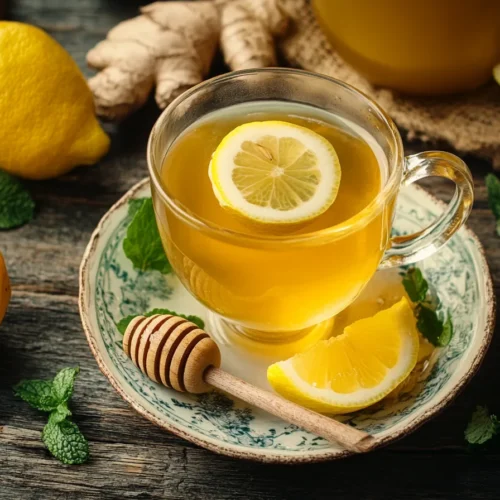
Ginger Tea with Honey and Lemon
Equipment
- Grater
- Glass container or teapot
- Strainer
Ingredients
Main Ingredients
- 1 inch fresh ginger root peeled and grated
- 1/2 lemon thinly sliced
- to taste honey
- 2 cups water
Instructions
- Peel and grate a one-inch piece of fresh ginger root into a glass container or teapot.
- Add thinly sliced lemon and honey to the container.
- Pour boiling water into the container and steep for five minutes.
- Strain the tea into cups and serve hot.

